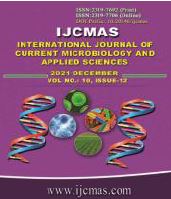


 National Academy of Agricultural Sciences (NAAS)
National Academy of Agricultural Sciences (NAAS)

|
PRINT ISSN : 2319-7692
Online ISSN : 2319-7706 Issues : 12 per year Publisher : Excellent Publishers Email : editorijcmas@gmail.com / submit@ijcmas.com Editor-in-chief: Dr.M.Prakash Index Copernicus ICV 2018: 95.39 NAAS RATING 2020: 5.38 |
Cancer is the uncontrolled growth of abnormal cells anywhere in a body. There are different types of cancers involves uncontrolled cell division and metastasis forming neoplasm and mass of undifferentiated cells that is tumor is a group of cells that have undergone unregulated growth which will often form a mass of tissue, but may be distributed slowly. Recent studies indicate that, the gut micro biome has emerged as an important mediating factor of health and disease. Interactions between microbes and human cells play very important roles in human metabolism including digestion of biomolecules like carbohydrates, production of essential amino acids, beneficial fatty acid synthesis and vitamin compounds. During cancer progression, these metabolic interactions between microbes and human cells may shift from one that support health to another that threatens it, as microbes begin interacting with cancer cells rather than healthy human cells. Indeed, microbial dysbiosis (disruption to the gut microbiota homeostasis caused by an imbalance in the microflora, changes in their functional composition and metabolic activities, or a shift in their local distribution) has been found to contribute to gastrointestinal cancer development. The mechanisms of action and these microbes appear to be diverse, with some activating the immune system, others inducing cell death via apoptosis and others inhibiting the growth of new blood vessels thereby depriving tumors of resources. It is the need of the hour for researchers where Future work should investigate the metabolic and ecological interactions between tumor cells and microbes that underlie this effect in order to discover new microbes that can be used in cancer treatments.
 |
 |
 |
 |
 |